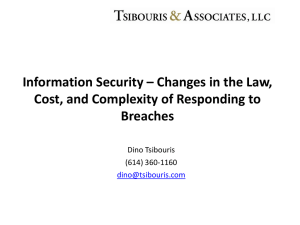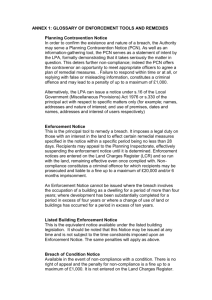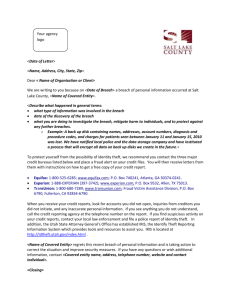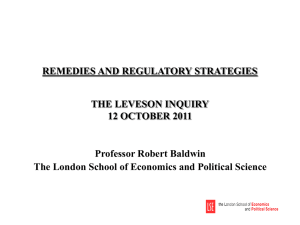Information Security: Changes in the Law, Cost, and Complexity of
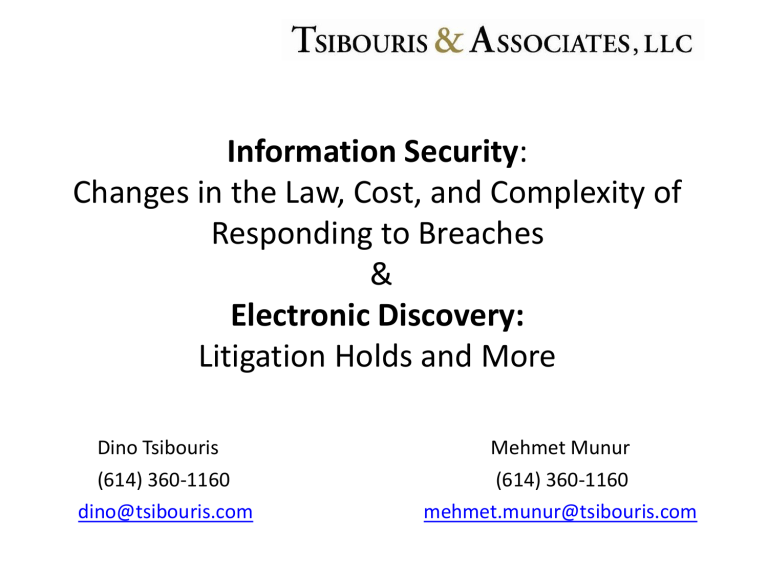
Information Security:
Changes in the Law, Cost, and Complexity of
Responding to Breaches
&
Electronic Discovery:
Litigation Holds and More
Dino Tsibouris
(614) 360-1160 dino@tsibouris.com
Mehmet Munur
(614) 360-1160 mehmet.munur@tsibouris.com
Information Security
Trends for 2010
• Increased federal and state regulation of information security
• Increased enforcement
• Increased costs to resolve a breach
• Increased compliance complexity
Information Security
Overview
• HITECH Act
• Enforcement Actions under HITECH
• Revisions to State Law on Data Security
• Enforcement Actions regarding Financial
Security
HITECH ACT
Amends HIPAA
• New breach notification rules
• New penalties
• Increased levels of minimum security
• State Attorney General enforcement
• Business Associates must comply
HITECH ACT
Amends HIPAA
• Covered Entity must notify individuals if a breach occurs
• Must notify HHS in annual log if less than 500 individuals
• Must notify HHS immediately if over
500 individuals
• May need to notify FTC
HITECH ACT
Business Associate Requirements
• Must comply with Security Rule regarding administrative, physical, and technical safeguards
• Develop policies
• Designate a security official
• Enforcement
HITECH ACT
Business Associate Requirements
• If your Covered Entity violates your
BAA, you are violating HIPAA
• Must cure breach, terminate, or report to HHS
• Must amend Business Associate
Agreements
HITECH ACT
Business Associate Requirements
• If the Business Associate has a breach, then it must notify the HIPAA Covered
Entity
• Covered Entity must then notify individuals and HHS
HITECH ACT
Penalties
• Tier A – inadvertent - $100 per violation up to $25,000/yr
• Tier B – reasonable cause, not “willful neglect” - $1,000 per violation up to
$100,000/yr
HITECH ACT
Penalties
• Tier C – “willful neglect” ultimately corrected - $10,000 per violation up to
$250,000/yr
• Tier D - “willful neglect” uncorrected -
$50,000 per violation up to $1.5 M/yr
CT Health Net Enforcement
Connecticut Attorney General - HIPAA
• Lost portable computer disk drive
• Involves privacy of 446,000 Connecticut enrollees
• Health information, social security numbers, and bank account numbers
• Failed to notify on time
CT Health Net Enforcement
Health Net failed to
• Ensure the confidentiality and integrity of electronic protected health information
• Implement technical policies and procedures for electronic information systems
• Implement policies and procedures that govern the receipt and removal of hardware and electronic media
CT Health Net Enforcement
Health Net failed to
• Implement policies and procedures to prevent, detect, contain, and correct security violations
• Identify and respond to suspected or known security incidents; mitigate, to the extent practicable, harmful effects of security incidents
• Effectively train all members of its workforce
CT Griffin Hospital Investigation
• Hospital terminates radiologist and his access to the computer systems
• Patients call hospital with complaints
• Audit reveals access to one terminal
• Ex-radiologist uses usernames and passwords of other radiology employees for 1 month
• Accesses ~1000 records
• Solicits patients for service at another hospital
Employee Snooping
• UCLA Cardiothoracic Surgeon
• Accesses system 323 times in 3 weeks
• Snoops on celebrity medical records
• Sentenced to 4 months in prison
• Similar incident in 2008
• UCLA reveals that 165 employees improperly viewed files in 13 years
• 15 fired for viewing octuplet mom’s records
MA Data Security Regulations
• Creates duty to protect personal data
• Applies to the personal information of MA residents
• Sophistication of safeguards increases with size and scope of business
• Requires encryption for transmission of personal data over public networks
• Effective date March 1, 2010
State Laws and PCI-DSS
• Minnesota, Washington, Nevada
• Requires encryption when electronically transmitting personal data
• Requires compliance with PCI-DSS
• May result in liability to Card Issuing Banks
• Some include Safe Harbors
Heartland Payment Systems Breach
• 6 th Largest Payment Processor
• Involved 330 Financial Institutions
• Heartland was PCI-DSS certified
• SQL injection attack
• CC#s, expiration dates, stored magnetic stripe data
• Lost ~130 million card numbers
Heartland Payment Systems Breach
• Removed from VISA CISP list
• Reported $105 million in expenses
– $90 million to Visa, MasterCard, Banks
– $3.5 million to AmEx
• Settles Cardholder Class Action for $2.4 million
• Stockholder Class Action in NJ Dismissed
Countrywide Breach
• Countrywide Financial Services
• Former employees
• Downloaded and sold customer data
• Every week for 2 years
• 19,000 individuals notified of breach
• Class action settles for over $10 million
Dave & Buster’s FTC Enforcement
• Dave & Buster’s loses 130,000 credit and debit card numbers
• Failed to take sufficient measures to protect credit card information
• Failed to limit access by third parties
• Settles with the FTC
Dave & Buster’s FTC Enforcement
Consent agreement requires D&B to:
– Appoint responsible employee
– Conduct risk assessment
– Develop security program and safeguards
– Develop criteria for selecting 3 rd party access to information
– Obtain biennial third-party audits for 10 years
Preparing for the Inevitable
• Update Business Associate Agreements
• Update Privacy and Security Policies
• Update IT Systems for Proper Access &
Security
• Update Security Incident Policies and
Procedures
• Update or Create Breach Notification
Procedures
Electronic Discovery
• Overview of Electronic Discovery
• Sanctions
• Requirements for Compliance
• Zubulake Revisited
• Case Examples
Electronic Discovery
Basics of Electronic Discovery
• Electronically Stored Information (ESI) is potentially discoverable
• Proportionality test
• Obligation to preserve
• Pending or threatened litigation
• Primary source should be active data
• Costs usually borne by producing party
Electronic Discovery
Sanctions usually require:
• Clear duty to preserve
• Culpable failure to Produce and Preserve
Relevant ESI
• Reasonable Probability of Material Prejudice
Due to Loss of ESI
E-Discovery Sanctions
• Monetary Sanctions
– Shifting or Awarding Discovery Costs, Fines
• Adverse Inference or Inability to use Affirmative
Defense
• Terminating Sanctions or Default Judgment
Electronic Discovery
Compliance requires:
– Record Retention Policies and Procedures
– Litigation Hold Procedures
– IT Policies, Procedures, and Systems for
• Preservation and Collection
• Search
• Production
• Destruction
Zubulake Revisited
• When the duty to preserve has attached, the following failures constitute gross negligence
– Failure to issue a written litigation hold
– Failure to identify all of the key players and to ensure that their electronic and paper records are preserved
Zubulake Revisited
– Failure to cease the deletion of email or to preserve the records of former employees that are in a party's possession, custody, or control
– Failure to preserve backup tapes when they are the sole source of relevant information or when they relate to key players, if the relevant information maintained by those players is not obtainable from readily accessible sources
Pinstripe Inc. v. Manpower Inc.
• Defendant failed to distribute litigation hold notice
• Possibly relevant emails destroyed
• 700 emails recovered from recipients
• Significant cost to defendant + $30K to outside vendor
• Court finds lack of intentional conduct
• Court awards sanctions of $2,500
Southeastern Mechanical Services v. Brody
• Plaintiff SMS alleges spoliation for deleted laptop and Blackberry data
• Defendant argues that laptop emails were stored on server
• Blackberries wiped
• Blackberries contained data other than emails
• Blackberries contained data before being synchronized with the server
Southeastern Mechanical Services v. Brody
• Court finds bad faith in deletion of Blackberry data
• Lack of email, text messages, telephone records was suspicious
• Court finds employees, not the corporations, culpable
• Court issues adverse inference
Starbucks v. ADT
• Starbucks seeks archived emails
• ADT argues that emails are not accessible
• Archived emails stored in a Plasmon System
• Exaggerates production costs at $834K
• Starbucks obtains two estimates at $17K and
$26K
Starbucks v. ADT
• Court ordered an immediate plan to make copies of the archived discs to an appropriate searchable storage medium
• Court ordered the production of relevant emails
• Court ordered the parties to confer and agree on fees
Conclusion
• Proper record retention policies
• Identify all key people and documents
• Preserve all relevant ESI
• IT Policies, Procedures, and Systems
• Proper and searchable archive technology
• Written litigation holds
Questions & Answers
Dino Tsibouris
(614) 360-1160 dino@tsibouris.com
Mehmet Munur
(614) 360-1160 mehmet.munur@tsibouris.com
